- Home
- Tove Jansson
Travelling Light Page 3
Travelling Light Read online
Page 3
“Just help yourselves,” Hanna urged them. “Elis is new here, so he can go first.”
Elis half stood up, took a sandwich with a sort of little bow, and said it was remarkably hot for the time of year. The children continued to goggle at him as if bewitched and Mia said, “Mum? Why’s he like that?”
“Ssh,” said Hanna. “Elis, please help yourself to some salmon. We caught four on Thursday.”
Elis stood halfway up again and observed that it was remarkable you could still find salmon when the water was so polluted. Then he told them what salmon cost in town, meaning of course for those who could afford to eat salmon outside of special occasions. Somehow he made them all uncomfortable.
In the evening, when Tom went to empty the slop pail into the bay, Elis followed and saw what he did and talked on and on about the polluted oceans and how irresponsible people were destroying the whole world.
“He’s weird,” Tom said. “You can’t talk to him. He just talks nonstop about pollution and how much everything costs.”
“Ignore it,” said Hanna. “He’s our guest.”
“Weird sort of guest! He follows me round all the time!”
It was quite true. Wherever Tom went, Elis was right behind: the boathouse, the fishing beach, the woodpile, absolutely everywhere.
“What are you doing now?”
“Making a bailer dipper, obviously.”
“Why don’t you have plastic bailers?”
“Just what we need,” said Tom contemptuously. “This dipper’s going to be a special shape, and it’ll take me a while to make it.”
Elis accepted this and said seriously, “Of course. What with decorating it, as well. But it’s such a waste of good work.”
“What do you mean?”
“I mean, since the world’s going to end, you might as well use plastic.”
And then he’d start in again, the whole thing, nuclear war and God knows what, blah, blah, blah, nothing but endless blather.
Their room was in the attic over the kitchen, with a sloping roof and a window that looked out toward the meadow. In the evening Elis would take ages folding his clothes and hanging them up, placing his right shoe properly next to the left and winding up his wristwatch.
“Yes, but what’s the point of all that?” Tom said. “You said a nuclear war could happen any minute, even tomorrow. Then it’s all down the drain with Friberg’s gherkins.”
“Friberg’s gherkins?”
“It’s just a saying.”
“Why? Who’s Friberg?”
“Lie down and go to sleep and stop being stupid. I don’t feel like talking.”
Elis turned to the wall. His silence was compact, but you knew very well what he was thinking, and you knew that little by little it would all come out, there was no stopping it, and come it did, a soft-spoken litany about the ruined sea and the ruined air and then all the wars and all the people who had nothing to eat and were dying everywhere all the time and what can we do, what can we do…
Tom sat up in bed and said, “But that’s all a million miles away. Come on, what’s really up with you?”
“I don’t know,” said Elis, adding after a while, “don’t be angry with me.”
Then, at last, silence.
* * *
Tom was used to being the eldest and making decisions and giving orders to Oswald and Mia and sorting out the silly things they did; it was just what older brothers do. But for some reason it was different with Elis; totally impossible to get any sense into him even though he was the same age as Tom. You just got angry with him. It didn’t even feel good when he admired you. And it was all so unfair. Like that business with the grebe. It wasn’t Tom’s fault the bird got stuck in the net. These things happen. He threw it in the water and Elis made a big deal out of it. “Tom. That grebe took a long time to die. They can dive tens of metres deep. Did you know that? Think how she must have felt, how long she must have tried to hold her breath…”
“You’re crazy,” Tom said, but it made him feel bad.
Or he might say, “I know what you do with kittens, you drown them. Do you have any idea…?” And on and on – it was unbearable.
Elis buried the grebe up near the road to the town where there had been a forest fire and there was nothing left among the tree stumps but willowherb; trust him to find a spot like that. He put up a cross with a number on it. Number one. Other graves followed – rat-trap victims, birds that had flown into windows, poisoned field mice, all solemnly buried and numbered. Sometimes Elis would remark in passing about all the lonely graves that had no one to care for them. “And where is your own family graveyard? I’m interested. Do you have a lot of relatives buried there?”
When it came to giving people a bad conscience, he was an expert. Sometimes all he had to do was just look at you with those gloomy, grown-up eyes and you would instantly be reminded of all your failings.
One day, when Elis’s forebodings were even gloomier than usual, Hanna cut him off. “You’re very well-informed about everything that’s dying and miserable, aren’t you, Elis?”
“I have to be,” he answered seriously. “No one else cares.”
For a moment Hanna was overcome by goodness knows what and wanted to take the child in her arms and hug him, but his stern gaze stopped her. “I shouldn’t be so hard on him,” she told herself later. “I must be kinder.” But before she had the chance, something terrible and unforgivable happened. Elis promised to give little Mia three Finnish marks to show him her bottom. “He wanted to watch me pee,” said Mia. And, almost as bad, Elis asked his landlord, “How much are you getting for me?”
“What did you say?”
“How much a month are you being paid for me? Is it over the counter? I mean, are you paying tax on it?”
Axel exchanged a look with his wife and left the kitchen.
On top of all this, Elis had a real talent for finding things that were broken. He was constantly dragging in damaged items and showing them to Tom. “Can you fix this? You can fix anything. Look, it’s been out in the rain and it’s gone all mouldy. It was nice, once.”
“Chuck it out,” said Tom. “I only make new things. I can’t be bothered with rubbish.”
Elis collected the junk in a pile beside his cemetery. The pile got bigger and bigger and he seemed almost proud of his sad collection. No one else ever noticed all the worn-out, useless junk scattered on the hill. They simply didn’t see it. But Elis did, with his sharp, critical eye. Sometimes when he fixed the family with that look of his, they would suddenly become conscious that their work clothes were filthy, and their hands.
One time Hanna spoke to him with a bit of authority, “Elis, please, just eat your dinner and stop agonising about everything. Put a little flesh on your bones so your father won’t be ashamed of you when he collects you in the autumn.”
Elis said, “You mean you’ll be able to put up with me until the autumn?” When no one said anything, he went on. “You waste an awful lot of food. Do you never think about all the people in the world who have no food at all? I’m sorry to have to say it, but I know what you throw away and how it all ends up in the sea.”
“That’s enough!” Axel burst out and got up from the table. “I’m going outside to look at the boats.”
Admittedly the Fredriksons were a bit spoiled. They didn’t like food unless it was absolutely fresh, whether fish or meat or Hanna’s home-baked bread, so a great deal did wind up down the drain with Friberg’s pickles, as the saying goes. Elis discovered this fact at once. He would go to the fridge and take out the leftovers that usually lay there until they were stale enough to be thrown away with a clear conscience. He would carefully rescue these remnants and eat them. He might say, for instance, “No meatballs, thank you. The old fish soup is fine for me.”
“Ha ha,” said Oswald, who followed most of what was happening and thought about it, and who never had his brother to himself any more because of the summer child. “Ha ha. You’re our
new slop pail, aren’t you?”
“We eat what we eat,” Axel said. “But it’s not good manners to comment on what our guests eat. Food is not something we discuss. It’s just a fact of life.”
“It most certainly is not,” Elis objected. “Think of all the poor people who don’t…” But that was as far as he got, because Axel banged his hand on the table and said, “Now you be quiet! And the rest of you, too. There’s no peace in this house any more.”
Out of doors, though, all was completely at peace. It was a time of light breezes and soft summer rain; down in the meadow the apple trees were in bloom, and all of nature was at its loveliest. In previous summers, Tom had wandered the woods and along the shore through the bright summer nights, but it was no fun this year. He could never count on being alone.
“Mum,” he said. “How long is he staying?”
“People come and people go,” Hanna answered. “Relax. There’s a time for everything. This, too, will pass.”
The worst part was that Elis was able to support all his arguments with incontrovertible statistics. Whenever the news came on, he glued his ear to the radio to collect new miseries or get the old ones confirmed. The news was the only programme he cared about. But he would sometimes mix actual catastrophes with his own fantasies, which then wormed their way so deeply into his dreadful prophecies that Tom didn’t know which way was up.
With Elis around, you had to be constantly ready for the worst. For example, Granny was a long-term patient in the local hospital, but when Elis came in and said, “She just died!” it turned out it wasn’t Granny he meant, but a crow with one leg, for heaven’s sake, that he’d been caring for all week.
One day when Hanna was taking the bus to go and see her mother, Elis asked if he could come along, and she thought why not. Of course he was a morbid child, but he did have great compassion for any creature in distress.
The experiment was not repeated. Granny didn’t care for all the sighing and groaning at her bedside. He shook his head mournfully and pressed her hand as if saying a final farewell, and when he went out for a few minutes, she asked Hanna angrily, “Who’s this insufferable child you’ve dragged along?”
There was no getting around the fact that the summer child was affecting everyone in the house. They were all a little afraid of him. Axel no longer smoked his pipe after meals but he stomped straight off to the boathouse. He’d grown sullen, and one day when Elis started interrogating him about his income and political views, he stood up and walked out in the middle of the fish soup. Little Mia was too small and innocent to understand, but she sensed the change and grew whiny and difficult. As for Oswald, he was openly jealous. Tom had no time for him any more, and when they did go out fishing together it wasn’t in the nice old friendly, peaceful way. Oswald developed a biting irony: “Are you really going to murder that poor little cod?” or “Look how many corpses in the net today!” And so forth. The whole family had fallen on evil days.
Axel and Hanna knew they’d put a terrible burden on Tom with this summer child, but what could they do? They had their hands full with their daily chores and the kids pretty much had to look out for themselves.
One day, Axel said, “Tom, forget about splitting that firewood, please, and go keep an eye on Elis.”
“I’d rather split wood. But he’ll be around my neck in any case, so what difference does it make?” “Well, do what you want,” said Axel helplessly and started to walk away, then turned back and said, “I’m so sorry about all this.”
You think you’re taking in an underprivileged child from the city, but no, you’re saddling yourselves with an implacably critical observer who never lets up about the wickedness and sorrows of the world. Do people in the city all raise their kids to view the world with suspicion? Do they all burden them with a conscience they’re too young to understand or manage? Axel discussed it with his wife and she thought maybe they did. The boy needed a change. Why not take him out on the water a bit, now the weather was so calm and beautiful? Hanna could use the time to visit some of her relatives in Lovisa, and Axel had to take some gas canisters out to the lighthouses in any case. The Coast Guard office had phoned that very morning to say the beacon at Västerbåda had gone out. Axel thought it was an excellent idea, so he went off to fuel the boat and stow the canisters, and Hanna started packing a lunch.
Elis was very excited. He kept tapping the barometer for fear of storms and asking about the lighthouses on their islands – were they on real islands, tiny islands?
“Real fly specks,” said Tom. “Why?”
Elis answered solemnly that he’d once read a story called “The Isle of Bliss” where the island had been very small.
“Yeah, yeah,” said Tom. “Hurry up; Dad’s waiting.”
“Come on, jump in!” Axel cried. “We’re off on a holiday, leaving all of our troubles behind!”
The children jumped aboard. Hanna stood on the dock and waved as the boat set off straight out to sea. It was a mild day, dazzlingly bright with high cumulus clouds mirrored in the sea and no horizon visible. Elis clung to the rail and watched for islands, occasionally turning to grin at Tom; he actually looked as if he was enjoying himself for once. So you’re on holiday, you little shit, Tom thought. For the moment you’ve forgotten that the world’s about to end, and you’re only thinking of yourself. A bitter sense of injustice welled up in him and he decided to be totally indifferent to Elis all the way out and back again.
The first lighthouse had been built on a very low skerry with a windswept crest of low bushes in the middle. When they landed, gulls rose and circled, screaming. Axel heaved the fresh canisters ashore and dragged them up over the rocks to the lighthouse.
At first Elis just stood and stared, stiff as a poker, then he dashed off, rushed up into the brushwood, and flung himself back down again. Eider hens flew up from their nests with a great roar, but Elis hardly noticed. He ran back and forth shouting at the top of his lungs and finally threw himself headlong into a crowberry bush.
“I told you he’s crazy,” said Oswald scornfully. “And you let someone like that run after you all day and night. That’s a fine friend you’ve made!”
Tom walked slowly up to where Elis was lying looking up at the sky, shamelessly contented.
Elis said, “I’ve never been on a real island before, one that looks like an island. It’s so small it could be mine.”
“You’re babbling,” Tom said. “Anyway, it belongs to the eiders too.” Then he walked away.
When Axel came back ready to move on to the next lighthouse, Elis wouldn’t budge. “I want to stay here,” he said. “I like this island.”
“But it could take a couple of hours,” Axel objected. “We have to get to some lights a long way out. Much more interesting places, high ground, all kinds of things you’d like.”
“It’s okay,” said Elis. “You go. I’ll stay here.”
They couldn’t get him to change his mind. In the end, Axel took Tom aside and said, “You’d better stay here with him till I come back and pick you up. He might fall in the water or do something stupid, and we’re responsible for the boy.”
Little Mia was shouting, “Want to go to the next lighthouse! Want to go to the next lighthouse!”
“But Dad,” said Tom, “I could be with him for hours on this tiny pancake of a place!”
“Course you could,” said his father, pushing off. “Sometimes we all have to do things we don’t like.”
“Try and find him some old rotting birds!” Oswald shrieked across the water. “Babysitter!”
It wasn’t till they reached the next lighthouse that Axel realised he still had the lunchbag with him. Hanna would never have done a thing like that, forgotten – but never mind, it could have been worse.
Then an hour later it did get worse. The fuel line broke, and you can’t fix a thing like that with a flick of the wrist.
* * *
“You know what,” said Elis, sounding almost reverent,
“This island’s wonderful. It’s so far away, nothing dangerous can get to it. And the water’s absolutely pure.”
“That’s what you think,” Tom said. He went farther out on the headland and began throwing small stones in the water. There was absolutely nothing to do but wait and let the time go by and be totally bored. Ha ha, some “Isle of Bliss”! Dark thoughts came and went and came back again: a whole summer of endless torture and responsibility, not a chance of ever being really alone, surrounded by a bunch of stupid burials and rubbish heaps… And, as if today’s misery wasn’t bad enough, he’d get to hear about tomorrow’s, when everything in the world would only get worse and worse. It wasn’t fair!
And here came Elis running up with eyes out on stalks, shouting: “An island forgotten in the deep blue sea! It’s fantastic! It’s so clean! So desolate and deserted!”
“Fantastic, my foot,” said Tom. “And it’s not exactly deserted, with so many eider chicks hatching this year.” He shrugged his shoulders and added, “Though there won’t be so many broods, the way you carry on.”
“What do you mean?”
“Just that if you scare an eider hen off her nest, she won’t come back. They’re very sensitive birds.”
Elis said nothing. It was fun watching him stride deeper into the crowberry thicket, one slow step at a time with his elbows tight against his sides and his thin neck stretched forward. Now, by God, he could feel for himself what it’s like to have someone give you a bad conscience. Tom followed him. Elis was staring down at five chicks, very small, dark and fluffy, sitting in their nest stock-still.
“Are they all right?” Elis whispered.
“Oh, don’t think about it. Think about how you’re on ‘an island forgotten in the deep blue sea’, isn’t that what you said? It might interest you to know that a little island like this can get forgotten for real. It’s hard to find your way back.”
Elis just stared.

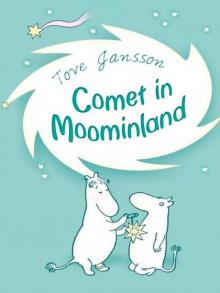 Comet in Moominland
Comet in Moominland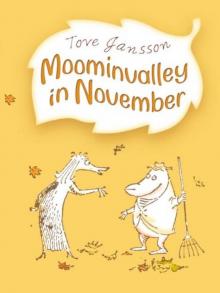 Moominvalley in November
Moominvalley in November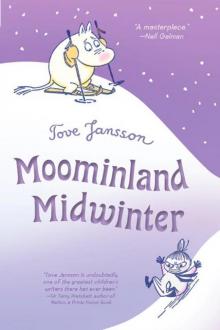 Moominland Midwinter
Moominland Midwinter Moominpappa's Memoirs
Moominpappa's Memoirs Sculptor's Daughter
Sculptor's Daughter The Listener
The Listener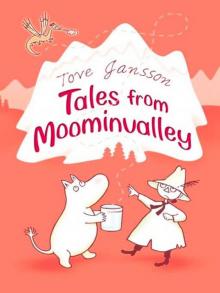 Tales From Moominvalley
Tales From Moominvalley Letters from Tove
Letters from Tove The Woman Who Borrowed Memories: Selected Stories
The Woman Who Borrowed Memories: Selected Stories Travelling Light
Travelling Light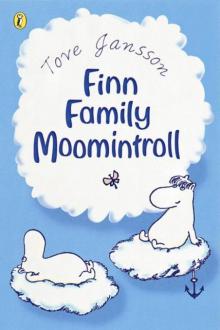 Finn Family Moomintroll
Finn Family Moomintroll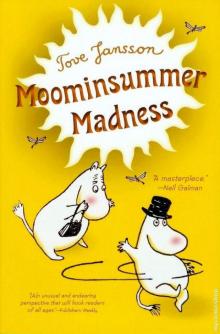 Moominsummer Madness
Moominsummer Madness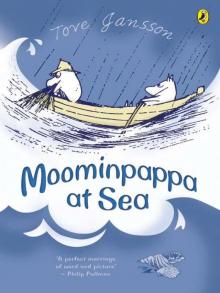 Moominpappa at Sea
Moominpappa at Sea Fair Play
Fair Play Letters From Klara
Letters From Klara Art in Nature
Art in Nature The Moomins and the Great Flood
The Moomins and the Great Flood The Exploits of Moominpappa
The Exploits of Moominpappa The Woman Who Borrowed Memories
The Woman Who Borrowed Memories